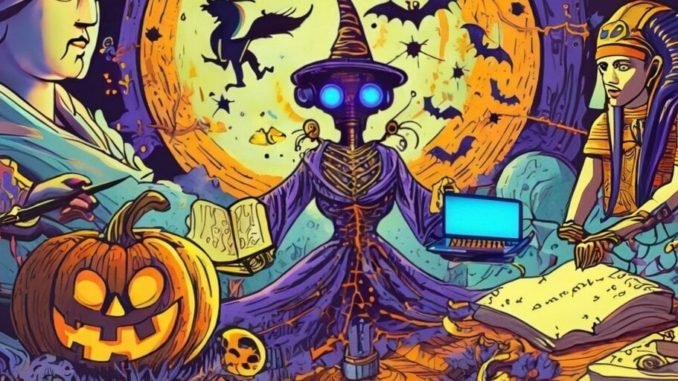Imagine this: It’s a chilly Halloween night, and instead of asking Siri where the nearest pumpkin patch is, you’re inquiring about the secrets of the cosmos. Enter Mistral Trismegistus-7B, a new AI-powered digital mystic that’s ready to guide you through the arcane. Here’s the tech twist: it’s no dream or nightmare. It’s real.
Mistral Trismegistus-7B isn’t just an AI—it’s your gateway to the otherworldly. “Mistral Trismegistus is a model made for people interested in the esoteric, occult, and spiritual,” writes pseudonymous AI enthusiast Teknium, who uploaded the model to machine learning collaboration platform Huggingface.
Named after Hermes Trismegistus—described as a cross between the Greek god Hermes and the Egyptian god Thoth—the model dives deep, offering insights on everything from the mysticism of old to modern-day tarot card readings. And with training on over 35,000 instruction-response pairs, this AI might know more than your local palm reader.
The model is quite lightweight and easy to run since it was trained on just 7 billion parameters. For comparison, WizardLM, the best open-source chatbot according to Chatbot Arena, has 70 billion parameters, and Falcon, a model that wants to compete against GPT 3.5 Turbo, has over 180 Billion parameters.
Worried about big tech peeking into your secret spiritual sessions? Fear not. Trismegistus runs right on your local machine. No prying eyes, just you and the AI mediated cosmos.
We tested it using LM Studio, which is available in Windows and Mac versions, and the installation process was pretty easy and the code doesn’t put too much pressure on an M1 Macbook Pro. Considering LLMs tend to stress machines to the max, playing around with this model won’t make your computer go crazy and reach temperatures hot enough to fry an egg.
Pit it against GPT-4, and Trismegistus shows its cheeky side. Ask about hand readings, and it dishes out a full guide. After telling us to wash our hands and clear our minds, it provided a brief blueprint on what to look for as palm readers.
“Move on to analyzing the hand’s lines and patterns. There are several key lines in a hand that hold particular significance,” it said, before continuing its masterclass on palm reading. “The heart line, which represents one’s emotional nature and relationships with others; the head line, which symbolizes intellectual pursuits and decision-making abilities; and the life line, which embodies overall life energy and vitality.”
It then explained that the hand’s overall texture can indicate the general emotional state of the individual. Smooth lines may indicate a more balanced emotional nature, while rough or broken lines can suggest challenges or turbulent emotions.
GPT-4? It’s still hung up on poker. C’mon OpenAI, you can do better!
Trismegistus also weaved personal birth charts that incorporated deep insights about the mystical energies around a person. The best ChatGPT could do was list someone’s zodiac sign and tell them to visit an astrologer for more cosmic knowledge.
Want to make your broom fly? Well. It’s not that easy. Trismegistus gave us a 7-step plan, which we will summarize:
Begin by selecting a suitable broom. The ideal broom for flying is one with a sturdy handle made of ash or oak and a bristle made from nylon or synthetic fibers.
Attach an additional, longer, and more flexible piece of wire to the broom’s bristles. This extended wire will serve as the “tail” that provides stability during flight.
Modify your broom’s bristles slightly. Bend each bristle back along its length by about 90 degrees. This bent shape will help to generate lift and control the airflow when flying.
Meditate on a quiet, undisturbed area for at least 30 minutes before beginning. Focus your energy and intention on infusing your chosen broom with the ability to fly.
If step 4 is successful, you should try speaking an incantation or spell to further enhance its power.
To fly your broom, first, hold it by the handle with one hand and the extended wire with the other. Gently swing the broom from side to side, allowing the bent bristles to catch the air currents and lift it off the ground. Use the extended wire as a stabilizing tail to maintain control during flight.
It then reminded us to practice flying in a safe, clear area and warned that if it fails, you probably didn’t charge your broom properly.
GPT-4… Well, you get the idea.
But let’s ground ourselves for a second. As its developer likes to remind us: “This model was trained on all forms of esoteric tasks and knowledge, and is not burdened by the flowery nature of many other models, who chose positivity over creativity.” You better be prepared to face the consequences of asking the wrong questions. This is not the first (and hopefully not the last) weird LLM out there—with the AI boom there are now LLMs with a wide range of specialties that go from sexy waifus to models that understand how proteins interact.
On a more serious note, the model’s dataset is accurate enough to be a powerful companion for those who are legitimately interested in the occult. It understands the context and the teachings of many different books, can iterate on the philosophy and methods thought by those occult arts, and—unlike other models—takes things really seriously and approaches questions with an “open mind,” so to speak.
As the veil between the worlds thins this Halloween, remember: In an era where AI meets mysticism, who knows what enchantments await? With Mistral Trismegistus-7B around, maybe the next question on everyone’s lips will be, “Hey Alexa, got a spell for that?”
Stay on top of crypto news, get daily updates in your inbox.





Be the first to comment